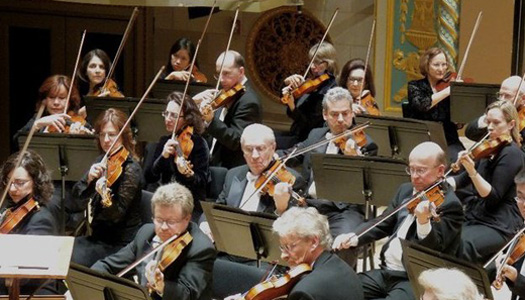
Violinists of the world, unite? Orchestra musicians across the U.S. are getting the same harsh treatment by management as steelworkers, city and state workers and others.
Gail Kruvand, assistant principal double bassist for the New York City Opera Orchestra, says her orchestra board and other nonprofit arts organizations these days are trying to run their institutions “like corporations.”
Following a bitter contract struggle with musicians earlier this year, her orchestra management slashed the number of performances per season from 100 to 16, making the musicians essentially part-timers. As a result, said Kruvand, who has been with the orchestra 21 years, she is “working way less” and her income is “down about 90 percent.”
The renowned Philadelphia Orchestra filed for bankruptcy last year. According to The New York Times, orchestra management “saw the filing as a way to eliminate pension costs and uncertainties as well as reduce musician salaries and operating bills.”
As part of its plan to get out of bankruptcy, the orchestra got the musicians to agree to cuts in pay and the number of musicians. It also pulled out of the American Federation of Musicians and Employers’ Pension Fund. That triggered a requirement that it compensate the fund by $35 million. It then got the fund to agree to accept $1.75 million instead.
In addition, just like steel companies dodging pension obligations, the orchestra wants to transfer its unfunded pension liabilities to the federally backed Pension Benefit Guaranty Corporation. The PBGC says the liabilities are $62 million, but the orchestra proposes to pay $1.3 million.
The plan still has to be approved by a judge.
American Federation of Musicians President Ray Hair called the bankruptcy filing “a clumsy, flatfooted attempt by management to free itself from musicians’ pension benefit obligations and leverage unjustified contract concessions from the orchestra.”
Philadelphia is only the latest in a wave of orchestra bankruptcy filings. Hair said musicians are being hurt by “employers’ use of bankruptcy as an escape hatch from unwanted labor agreements.”
The Louisville and Honolulu orchestras filed for bankruptcy in 2010. The Syracuse Symphony Orchestra filed for bankruptcy last April.
Last August, the AFM put the Louisville Orchestra on its “Unfair List,” when the orchestra got out of bankruptcy without an agreement with its union musicians. Then the orchestra began recruiting non–union “scab” replacement musicians. Finally orchestra musicians agreed to cuts in the number of musicians and performances, effectively cutting their pay.
Other orchestras are also cutting full–time professional musicians down to seasonal employees.
There have been orchestra strikes or strike authorizations across the country, including Columbus, Ohio; Shreveport, La.; and Seattle.
Last year, after a six-month strike, Detroit Symphony Orchestra musicians wound up agreeing to slash their own pay by a whopping 23 percent.
The Cleveland Symphony Orchestra two years ago tried to get wage cuts and higher health premiums from its musicians. The musicians successfully beat back those efforts, but they had to agree to other concessions.
Some orchestra managements have not adopted the CEO anti–worker mindset and are doing well with that approach. But many, echoing Republican governors (and some Democrats) and CEOs, argue that musician pay, benefits and pensions are unaffordable in today’s economy.
Those costs are indeed a major factor for orchestras. But why not? Would there be music to hear without musicians, highly trained and talented, who devote their lives to their profession?
Some orchestras have been trying to block unionization of their musicians by forcing them to agree to be classified as independent contractors. But last December, the National Labor Relations Board ruled that orchestra musicians are statutory employees, not independent contractors, and therefore have the right to collective bargaining with their employers. The NLRB noted that orchestra management sets work hours, pay schedules, dress codes, standards for behavior, and discipline.
Michael Kaiser, president of the Kennedy Center for the Performing Arts, strongly disputed the idea that unions are the cause of arts organizations‘ financial woes.
“It is not the fault of union members that we are selling fewer tickets or raising less funds,” he wrote. “We can blame a terrible economy, lack of arts education in our schools, substantially lower government grants at every level and new forms of entertainment that compete for the time and resources of our audiences for much of the reduction in resources.”
Poor management is a key factor, he said. “Cutting wages is not a long term strategy for success. The only way to assure success for any not for profit is to build a sustained and growing revenue producing capability.”
San Francisco Chronicle music critic Joshua Korman wrote that venerable orchestras got into trouble “the same way Lehman Bros. and Bear Stearns did: through poor – and specifically shortsighted – leadership. And just like on Wall Street, the people making these decisions aren’t really the ones whose livelihoods are on the line.”
Federal, state and local public funding generates just 13% of typical arts organizations’ budgets. Orchestras are heavily dependent on private donors (rich people and corporations) and foundations.
It appears many orchestra boards have jumped on the Scott Walker bandwagon of blaming their problems on workers (musicians) and unions.
Not everyone is an orchestra fan, but everyone has a stake in the flourishing of arts in our society, and that means the flourishing of those who produce the art. Violinists, clarinetists of the world, unite – indeed!
Photo: Detroit Symphony Orchestra Musicians Official Facebook page












Comments